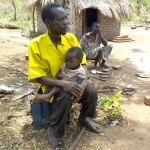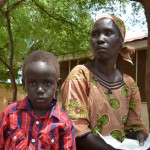Speeches Shim

Mercy Edward was pregnant when fighting erupted near the home she and her husband Abraham Charles Zinone shared in Western Equatoria, South Sudan, in May 2015. The civil war that began in the capital, Juba, in December 2013 had now spread west.

Six-year-old Yohana Peter clutches a bottle of mango juice as he waits for his medication outside a pharmacy at Al Sabah Children’s Hospital in Juba, South Sudan. Seated next to his mother on a metal bench, Yohana looks anxious.
South Sudan now has more children not attending school than any other country, according to the United Nations—1.8 million children aged 6 to 15.
South Sudan’s dwindling elephant population—there are only an estimated 2,500 remaining—is under threat from poachers who illegally sell their ivory tusks. Their precarious survival is threatened even more by conflict and lack of government resources.


Comment
Make a general inquiry or suggest an improvement.